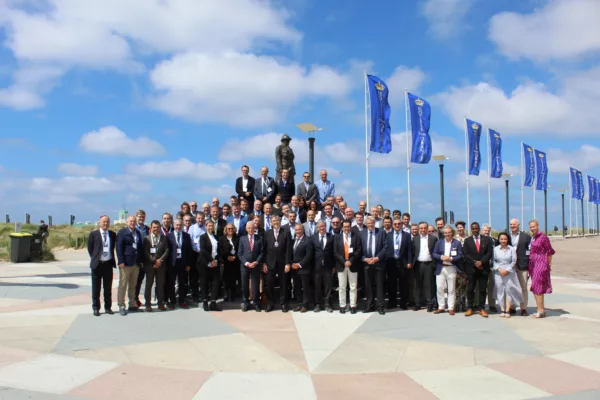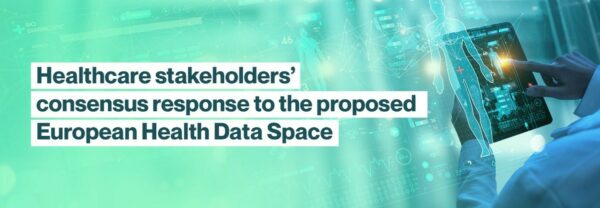EAU uniquely placed to help European urologists' ambitions
Every year, the EAU meets with representatives from Europe’s national urological societies in Noordwijk, on the Dutch coast, for a discussion on how the EAU and the societies can help each other raise urological care across the continent.

Topics like European regulations, transnational research, specific needs for training, and even the very definition of urology itself were discussed on 21 and 22 June, 2019.
This year, discussions were structured around four themes: the EAU and the European Union; urological education in Europe; patient engagement and Guidelines; and science and research. After an initial presentation by the responsible EAU board member(s) and other experts, the groups dispersed for break-out sessions where the topics were discussed further. The next day, highlights and conclusions were presented from these sessions, and further discussed.
Helping urology through the EU
EAU Secretary General Prof. Chris Chapple was joined by Adjunct Secretary General (Education) Prof. Hein Van Poppel and Sarah Collen (Brussels, BE), EU Policy Coordinator EAU for the first series of talks on the EAU’s activities and goals in Brussels.
Mrs. Collen gave the audience a refresher on how the European Union is organised, and how EU policy does and can impact urology in each European country. “While healthcare is often a national matter, with a ministry that makes strategic and funding decisions, the EU has a mandate to protect its citizens and promote public health,” Mrs. Collen said. “EU legislation impacts how you work: quality standards, tobacco legislation, cross-border health threats and the freedom of movement for your staff.”
The EAU is targeting the European Union on behalf of the continent’s urologists on three levels: the European Commission (which proposes legislation), the European Parliament (elected MEPs) and the European Council (representing member states’ governments). The EAU participates in the European Prostate Cancer Awareness Day (EPAD), has published policy white papers and has developed the #EUpledge4prostatecancer, a tool that encourages MEPs to voice their support for prostate cancer research, screening and raising the topic in parliament.
“National societies and individual urologists can reach out to their country’s European Members of Parliament. Upcoming EU presidencies can offer high-profile events for raising attention around urology,” Collen suggested. Countries with upcoming six-month terms of Presidency are Finland, Croatia, Germany, Portugal, Slovenia and France.
Prof. Chapple also pointed to the potential for funding and research for urology that could potentially be secured with the help of national societies. Horizon Europe is a new research and innovation framework programme that had a budget of €100 billion, €7.7 billion of which is earmarked for healthcare and a ‘cancer mission’.
eUROGEN is one of the major initiatives that the EAU has with the European Union. It is an ongoing European Reference Network for rare urogenital diseases and complex conditions, which currently counts 29 healthcare providers in 11 EU member states, as well as several affiliated partners. “The platform offers a multidisciplinary approach for rare cases, allowing for highly specific advice to be brought in. The network is set up and run by the EAU, and now self-supporting. We encourage you all to share information and get free advice."
Following the break-out sessions, Prof. Chapple noted interest from a number of participants. “We’re happy to see interest in eUROGEN. This is a free service that your members might find helpful. It’s a powerful tool, the funding is there and we must keep supporting it.” Participation is limited to EU and EEA member states.
Prof. Van Poppel spoke at the EU session about the need for improved and comprehensive screening for prostate cancer, taking the opportunity to fact find among the national societies about current national policies on (PSA-based) screening. “Since the introduction of PSA-based testing in the 1980s, we have seen a tremendous decrease in mortality,” Prof. Van Poppel said. “But in recent years, this trend has threatened to reverse. Smart use of PSA, novel biomarkers, mpMRI and active surveillance can avoid the risks of overdiagnosis while also decreasing PCa-related mortality.”
The EAU is actively lobbying the EU for continent-wide attention for PCa and men’s health, through the aforementioned EPAD and white papers. Talks during the break-out sessions revealed national societies’ interest in increased or more effective screening through international cooperation, although in some countries terms like “PSA screening” are legal red flags with implications of overtreatment. It was decided to use the term 'PCa Early Detection Programme' to refer to the EAU's efforts in this field.
Education, Guidelines and patient engagement
The EAU and the national societies can find further areas of cooperation when it comes to urological education (certification and training), the widely-used EAU Guidelines (specifically their adherence, which varies greatly), and in reaching urology patients.
ESU Chairman Prof. Joan Palou summarised the EAU’s large range of educational programmes that Europe’s urologists can take part in, both at the EAU’s events, and when offered at national societies’ own annual meetings. Prof. Palou mentioned the increasing popularity of e-courses and webinars (often as a first step to further on-site training), the development of standardised curricula (for instance for robotic surgery) and the possibility of a “Urology bootcamp” for first-year residents.
The EAU is also paying close attention to who is qualified to lead training sessions, the so-called “training the trainers” programme. Considering the many possibilities for implementing the ESU’s education know-how around Europe, Palou quipped “USE ESU.”
The break-out sessions revealed that in some countries, the requirement for potential clinical fellowships of having at least three PubMed publications is a hurdle. Prof. Palou suggested a course on how to write scientific papers, perhaps also making more research data available for potential authors.
Prof. Jens Sønksen raised the idea of EAU Educational Ambassadors: members of each national society who could represent the European School of Urology and disseminate materials on a national level. This idea was further discussed in the break-out sessions and was met with enthusiasm.
EAU Guidelines Office Chairman Prof. James N’Dow focused his presentation not on the quality or the wide use of the EAU Guidelines, but rather on their implementation. “Studies from different parts of the world reveal that 30-40% of patients do not receive care according to the current scientific evidence, and in fact 20-25% of care is potentially harmful,” said Prof. N’Dow. “Eminence-based medicine, in direct contradiction to our Guidelines is unfortunately still practised, including in larger European countries.” N’Dow highlighted the efforts of the Guidelines Office’s IMAGINE Group in quantifying the adherence to the Guidelines, identifying possible obstacles and coming up with possible interventions to effectively implement prioritised recommendations.
Prof. N’Dow also gave an update on the first year of the PIONEER European Network of Excellence, an international big data prostate cancer network, partly funded by the European Union. National societies are very much encouraged to disseminate the project’s objectives to their members in an attempt to increase the number of participating centres. One national society was planning to include PIONEER leaflets in their annual meeting’s congress bags.
Dr. Mark Behrendt (Amsterdam, NL), Chairman of the Patient Information Working Group, highlighted the EAU's work on producing innovative Patient Information. Patient-oriented materials are currently available in several languages and the national societies were invited to contribute. Other outreach campaigns include Urology Week.
Science and Research
Prof. Stenzl, in his new role as Adjunct Secretary General in charge of Science, introduced the EAU’s efforts in maintaining and improving the high level of urological science in Europe. He cited the Scientific Congress Office, the variety of active EAU Sections and the Research Foundation as the major tools to achieve this.
Prof. Morgan Rouprêt (Paris, FR), the new chairman of the EAU Section for Onco-Urology was invited to speak on the EAU’s efforts in this field. Rouprêt spoke of the ESOU’s ambitions to go beyond an annual section meeting, but also work with the ESU in educational activities and contribute heavily to the journal EU Oncology. The ESOU will also offer its services to have sessions at national society meetings across Europe, and national societies should reach out to explore the possibilities.
Much of the EAU’s efforts on onco-urology stem from the changing role of the urologist, a topic that regularly came up in the break-out sessions. In some countries, urologists might see their primary duties going to gynaecologists or oncologists, and vast differences in what a urologist is allowed to prescribe in treating urological cancers also exist. Prof. Wirth emphasised that urologists are “not robot technicians, but organ specialists.”
A special Task Force was recently convened to deal with this challenge. Its major conclusions, also presented by Profs. Stenzl and Rouprêt at the National Societies meeting was that the EAU should get a clear grasp of each European country's rules on urologists prescribing oncological drugs, and possibly assist in education and certification. Training through new and existing masterclasses, the EAU's Oncology Update meetings and structured examination would be major steps toward oncology certification for urologists.


